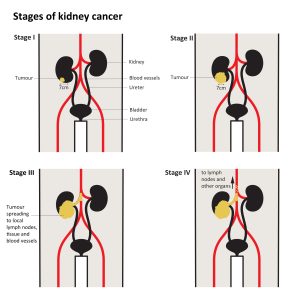If you or someone you love has just been diagnosed with kidney cancer, it’s normal to be upset. You’re probably also wondering how it happened, where it came from, what it means, and what happens next.
Kidney cancer is a type of cancer that starts from the cells of the kidney. It is relatively rare, accounting for only 2-3 of every 100 people with cancer in Australia.
- Localised kidney cancer – cancer that has formed in the kidney but has not spread from the kidney. Usually there is only one tumour in one kidney. Sometimes two or more tumours occur in the same kidney or in both kidneys.
- Advanced kidney cancer – cancer that has spread (metastasised) from the kidney to somewhere else in the body. The most common sites are the lymph nodes, lungs, brain and bones.
The exact cause of kidney cancer is not known, but certain factors are known to increase a person’s risk of developing kidney cancer. These risk factors include:
- increasing age
- smoking
- male sex (twice as common in males)
- obesity
- high blood pressure (hypertension)
- Hepatitis C infection
- occupational exposure to toxic compounds
- long-term dialysis and acquired cystic disease
- family history of kidney cancer
- specific genetic and hereditary conditions.
Most people with kidney cancer have no symptoms. They are often diagnosed with kidney cancer when they have a scan or X-ray that their doctor ordered for another health problem.
When kidney cancer does cause symptoms, they can include:
- blood in the urine or changes in urine colour to dark, rusty or brown (haematuria)
- pain in lower back or one side which is not due to an injury
- pain or lump in the abdomen or side
- weight loss
- constant tiredness
- newly developed high blood pressure
- fever or night sweats which are not linked with any other conditions.
Some of these symptoms can also be caused by other illness, such as a urine infection or a muscle twinge. So, if you experience any of these symptoms it does not necessarily mean you have kidney cancer. However, always talk to your doctor if you are experiencing any of these symptoms.
Your doctor will use different tests to diagnose and get more information about what type of kidney cancer you have. The tests can be divided into blood and urine tests, imaging, tissue biopsy (a small piece of tissue is removed for testing and examination under a microscope) and cystoscopy (an investigation where a special viewing camera is inserted via the urethra into the bladder). The tests you have will depend on your particular situation.
The results of your tests give information about:
- the exact subtype of kidney cancer – how the cancer cells look under a microscope and other features
- the grade of kidney cancer – how abnormal the cells are and how fast they may grow
- the stage of kidney cancer – how large the cancer is and how far it has spread.
The stages of kidney cancer are:
- Stage 1-2 – Localised (where the cancer has not spread beyond the local kidney)
- Stage 3 – Locally advanced (where the cancer has spread to tissues near the kidney)
- Stage 4 – Advanced (where the cancer has spread to other organs in the body).


If you need more help
Kidney cancer treatment depends on what stage you’re in. For more information and support, visit the Cancer Council website.
If you’d like to speak to someone, you can always call our free Kidney Helpline service on 1800 454 363 during business hours.
Last updated: October 2025

